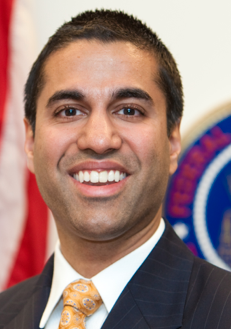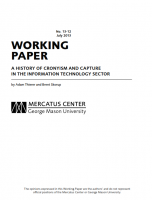K. Eric Drexler of Oxford University discusses his latest book Radical Abundance: How a Revolution in Nanotechnology Will Change Civilization. Drexler, who has been referred to as “the founding father of nanotechnology” covers how society can conserve resources and make more efficient products through nanotechnology; how nanotechnology can solve some of the world’s most pressing problems; how this varies from what you’ve seen in science fiction; and, how we can improve manufacturing at the molecular level.
Download
Related Links
The New York Times reports:
The Russians, who with only minimal success, had for years sought to make these companies provide law enforcement access to data within Russia, reacted angrily. Mr. Gattarov formed an ad hoc committee in response to Mr. Snowden’s leaks.
Ostensibly with the goal of safeguarding Russian citizens’ private lives and letters from spying, the committee revived a long-simmering Russian initiative to transfer control of Internet technical standards and domain name assignments from two nongovernmental groups that control them today to an arm of the United Nations, the International Telecommunications [sic] Union.
It’s not immediately clear to me how moving Internet standards and DNS from IETF and ICANN to the ITU is supposed to stop the NSA from spying on Russians, so the smart read is that this is retaliation pure and simple.
Brazil’s foreign minister, Antonio Patriota, for example, a week ago endorsed the Russian proposal to transfer some control over Internet technical standards to the United Nations telecommunications agency.
While these are not major changes in policy positions, the NSA’s surveillance programs seem to be galvanizing those who want the ITU to take an active role in Internet governance. It’s time for the USA to practice what it preaches on Internet freedom.
“In today’s globally competitive era, the United States cannot continue to delay its transition to Internet-enabled infrastructure.”
Last week the Department of Defense (DoD) filed comments with the FCC in its proceeding examining the transition from outdated telephone technologies to Internet Protocol (the “IP-transition”). The comments, which were filed “on behalf of the consumer interests” of the DoD by a civilian attorney in the Army’s Regulatory Law Office (emphasis added), ask the FCC to “consider potential adverse consequences on public safety and national security” of requiring federal agencies to “prematurely transition to different technologies.”
What are these potential adverse consequences? The italicized “interests” of the DoD provide the answer: It wants to avoid incurring any costs to upgrade its outdated telephone technologies to modern, Internet Protocol technologies when its current communications contracts expire in 2017. Continue reading →

 I was honored to be asked by the editors at Reason magazine to be a part of their “Revolutionary Reading” roundup of “The 9 Most Transformative Books of the Last 45 Years.” Reason is celebrating its 45th anniversary and running a wide variety of essays looking back at how liberty has fared over the past half-century. The magazine notes that “Statism has hardly gone away, but the movement to roll it back is stronger than ever.” For this particular feature, Reason’s editors “asked seven libertarians to recommend some of the books in different fields that made [the anti-statist] cultural and intellectual revolution possible.”
I was honored to be asked by the editors at Reason magazine to be a part of their “Revolutionary Reading” roundup of “The 9 Most Transformative Books of the Last 45 Years.” Reason is celebrating its 45th anniversary and running a wide variety of essays looking back at how liberty has fared over the past half-century. The magazine notes that “Statism has hardly gone away, but the movement to roll it back is stronger than ever.” For this particular feature, Reason’s editors “asked seven libertarians to recommend some of the books in different fields that made [the anti-statist] cultural and intellectual revolution possible.”
When Jesse Walker of Reason first contacted me about contributing my thoughts about which technology policy books made the biggest difference, I told him I knew exactly what my choices would be: Ithiel de Sola Pool’s Technologies of Freedom (1983) and Virginia Postrel’s The Future and Its Enemies (1998). Faithful readers of this blog know all too well how much I love these two books and how I am constantly reminding people of their intellectual importance all these years later. (See, for example, this and this.) All my thinking and writing about tech policy over the past two decades has been shaped by the bold vision and recommendations set forth by Pool and Postrel in these beautiful books.
As I note in my Reason write-up of the books: Continue reading →
 Ajit Pai, a Republican commissioner at the Federal Communications Commission (FCC), had an outstanding op-ed in the L.A. Times yesterday about state and local efforts to regulate private taxi or ride-sharing services such as Uber, Lyft, and Sidecar. “Ever since Uber came to California,” Pai notes, “regulators have seemed determined to send Uber and companies like it on a one-way ride out of the Golden State.” Regulators have thrown numerous impediments in their way in California as well as in other states and localities (including here in Washington, D.C.). Pai continues on to discuss how, sadly, “tech start-ups in other industries face similar burdens”:
Ajit Pai, a Republican commissioner at the Federal Communications Commission (FCC), had an outstanding op-ed in the L.A. Times yesterday about state and local efforts to regulate private taxi or ride-sharing services such as Uber, Lyft, and Sidecar. “Ever since Uber came to California,” Pai notes, “regulators have seemed determined to send Uber and companies like it on a one-way ride out of the Golden State.” Regulators have thrown numerous impediments in their way in California as well as in other states and localities (including here in Washington, D.C.). Pai continues on to discuss how, sadly, “tech start-ups in other industries face similar burdens”:
For example, Square has created a credit card reader for mobile devices. Small businesses love Square because it reduces costs and is convenient for customers. But some states want a piece of the action. Illinois, for example, has ordered Square to stop doing business in the Land of Lincoln until it gets a money transmitter license, even though the money flows through existing payment networks when Square processes credit cards. If Square had to get licenses in the 47 states with such laws, it could cost nearly half a million dollars, an extraordinary expense for a fledgling company.
He also notes that “Obstacles to entrepreneurship aren’t limited to the tech world”:
Across the country, restaurant associations have tried to kick food trucks off the streets. Auto dealers have used franchise laws to prevent car company Tesla from cutting out the middleman and selling directly to customers. Professional boards, too, often fiercely defend the status quo, impeding telemedicine by requiring state-by-state licensing or in-person consultations and even restricting who can sell tooth-whitening services.
What’s going on here? It’s an old and lamentable tale of incumbent protectionism and outright cronyism, Pai notes: Continue reading →
Adam Thierer, Senior Research Fellow at the Mercatus Center discusses his recent working paper with coauthor Brent Skorup, A History of Cronyism and Capture in the Information Technology Sector. Thierer takes a look at how cronyism has manifested itself in technology and media markets — whether it be in the form of regulatory favoritism or tax privileges. Which tech companies are the worst offenders? What are the consequences for consumers? And, how does cronyism affect entrepreneurship over the long term?
Download
Related Links
This afternoon, Berin Szoka asked me to participate in a TechFreedom conference on “COPPA: Past, Present & Future of Children’s Privacy & Media.” [CSPAN video is here.] It was a in-depth, 3-hour, 2-panel discussion of the Federal Trade Commission’s recent revisions to the rules issued under the 1998 Children’s Online Privacy Protection Act (COPPA).
While most of the other panelists were focused on the devilish details about how COPPA works in practice (or at least should work in practice), I decided to ask a more provocative question to really shake up the discussion: What are we going to do when COPPA fails?
My notes for the event follow down below. I didn’t have time to put them into a smooth narrative, so please pardon the bullet points. Continue reading →
 The Mercatus Center at George Mason University has just released a new paper by Brent Skorup and me entitled, “A History of Cronyism and Capture in the Information Technology Sector.” In this 73-page working paper, which we hope to place in a law review or political science journal shortly, we document the evolution of government-granted privileges, or “cronyism,” in the information and communications technology marketplace and in the media-producing sectors. Specifically, we offer detailed histories of rent-seeking and regulatory capture in: the early history of the telephony and spectrum licensing in the United States; local cable TV franchising; the universal service system; the digital TV transition in the 1990s; and modern video marketplace regulation (i.e., must-carry and retransmission consent rules, among others.
The Mercatus Center at George Mason University has just released a new paper by Brent Skorup and me entitled, “A History of Cronyism and Capture in the Information Technology Sector.” In this 73-page working paper, which we hope to place in a law review or political science journal shortly, we document the evolution of government-granted privileges, or “cronyism,” in the information and communications technology marketplace and in the media-producing sectors. Specifically, we offer detailed histories of rent-seeking and regulatory capture in: the early history of the telephony and spectrum licensing in the United States; local cable TV franchising; the universal service system; the digital TV transition in the 1990s; and modern video marketplace regulation (i.e., must-carry and retransmission consent rules, among others.
Our paper also shows how cronyism is slowly creeping into new high-technology sectors.We document how Internet companies and other high-tech giants are among the fastest-growing lobbying shops in Washington these days. According to the Center for Responsive Politics, lobbying spending by information technology sectors has almost doubled since the turn of the century, from roughly $200 million in 2000 to $390 million in 2012. The computing and Internet sector has been responsible for most of that growth in recent years. Worse yet, we document how many of these high-tech firms are increasingly seeking and receiving government favors, mostly in the form of targeted tax breaks or incentives. Continue reading →
Patrick Ruffini, political strategist, author, and President of Engage, a digital agency in Washington, DC, discusses his latest book with coauthors David Segal and David Moon: Hacking Politics: How Geeks, Progressives, the Tea Party, Gamers, Anarchists, and Suits Teamed Up to Defeat SOPA and Save the Internet. Ruffini covers the history behind SOPA, its implications for Internet freedom, the “Internet blackout” in January of 2012, and how the threat of SOPA united activists, technology companies, and the broader Internet community.
Download
Related Links
Senator Marco Rubio is right on immigration. In his remarks regarding the immigration bill passed by the Senate last week, Rubio noted that immigration is an American story.
For over two hundred years now, they have come. . . . From Ireland and Poland, from Germany and France. From Mexico and Cuba, they have come. They have come because in the land of their birth, their dreams were bigger than their opportunities.
As Jack Kemp so famously said, “We are a nation of immigrants.” From the Native Americans who crossed the land bridge over what is now the Bering Strait to the apex of European immigration in the early 20th Century (when 13.5 million immigrants were living in the United States), America has always been the land of opportunity. Continue reading →
Continue reading →






 The Technology Liberation Front is the tech policy blog dedicated to keeping politicians' hands off the 'net and everything else related to technology.
The Technology Liberation Front is the tech policy blog dedicated to keeping politicians' hands off the 'net and everything else related to technology.